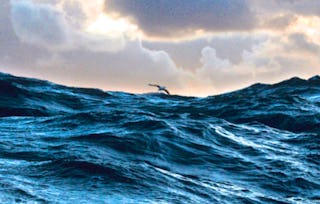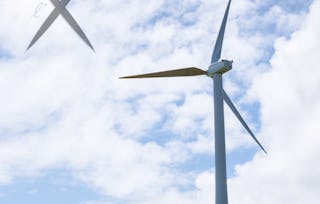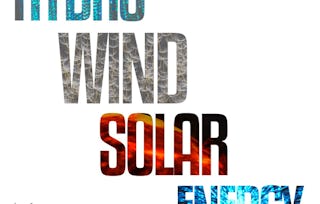In this course you can learn about the mechanics of global weather, the foundations of ocean meteorology, predictive modeling and how sailors receive data via satellite and use high-performance navigation software.


Strategies for winning. Meteorology in a round the world regatta


Strategies for winning. Meteorology in a round the world regatta

Dozent: Tomàs Molina
6.370 bereits angemeldet
Bei enthalten
144 Bewertungen
Kompetenzen, die Sie erwerben
- Kategorie: Time Series Analysis and Forecasting
- Kategorie: Physical Science
- Kategorie: Risk Control
- Kategorie: Communication Systems
- Kategorie: Climate Change Adaptation
- Kategorie: Predictive Modeling
- Kategorie: Simulation and Simulation Software
- Kategorie: Safety Assurance
- Kategorie: Mathematical Modeling
- Der Fähigkeiten-Abschnitt ist eingeklappt. 8 von 9 Fähigkeiten werden angezeigt.
Wichtige Details

Zu Ihrem LinkedIn-Profil hinzufügen
6 Aufgaben
Erfahren Sie, wie Mitarbeiter führender Unternehmen gefragte Kompetenzen erwerben.

In diesem Kurs gibt es 6 Module
In this module you will learn the foundations for an understanding of general and in particular maritime meteorology. What are the factors and engines powering the weather? What do we need to know to understand the weather phenomena we experience every day? What do ocean sailors need to know to predict the weather? Instructors: Tomàs Molina, Santi Serrat
Das ist alles enthalten
13 Videos13 Lektüren1 Aufgabe
In this module you will learn: How meteorological predictions are made. What numerical weather models and equations look like. This will be explained by Tomàs Molina in Module 2.1 You will look at the forecasting structures that help us to interpret the information given by the models: Advection, troughs, ridges, barometric swamps and low pressure systems. These will be explained by Tomàs Molina in Module 2.2 What the basic prediction models used by sailors are. This will be explained by Marcel van Triest in Module 2.3 Remember you can access to the help forum . If you are experiencing difficulty learning or accessing course content, or if you simply want more information.
Das ist alles enthalten
10 Videos12 Lektüren1 Aufgabe
In this module you will learn how sailors use meteorology to sail around the world and to win round the world regattas. All of their interest is focussed on the wind and they need theoretical, but above all practical, knowledge to help them to take the correct decisions at sea. Remember you can access to the help forum. If you are experiencing difficulty learning or accessing course content, or if you simply want more information.
Das ist alles enthalten
14 Videos17 Lektüren1 Aufgabe
The science of meteorology is a fundamental part of any type of ocean navigation. In the case of yacht racing, it's importance is even greater, given that the wind is the force propelling the boat and is the key factor in formulating the strategy and tactics needed to win. However, the lead role of meteorology in a regatta is for safety, and that is something that the race organisers always make a priority. In Module 4.1 the general climatology for a regatta such as the Barcelona World Race is described, as well as the preparations the skippers make with the sails, the boat and other personal kit. In Module 4.2 you will learn how the Race Management of a regatta work together with the meteorologist to ensure that the information reaches the boats and to guarantee the maximum safety levels for the crews. In Module 4.3 the type of information the crews receive whilst out on the oceans is described, as well as the telecommunications systems used to make this happen. In Module 4.4 you will learn how weather information impacts on safety and you will look at the specific case of ice detection in the Southern Ocean.
Das ist alles enthalten
7 Videos6 Lektüren1 Aufgabe
We begin now by going over the Barcelona World Race round the world route. In Module 5 you will learn about general and specific strategies for sailing from Barcelona to the Indian Ocean.
Das ist alles enthalten
7 Videos6 Lektüren1 Aufgabe
In this module we are going to study the meteorology and strategy for the seas of the south of the planet. Down in the Southern Ocean is where the sailors go up against the toughest sailing conditions in the regatta and where they must also abide by safety restrictions due to the danger of floating ice. On the following pages, Marcel van Triest will analyse general strategy and also look at case studies from the Barcelona World Race 2010/11. In that edition, ice gates were used to restrict the fleet's descent south and to avoid boats heading into danger zones. For the 2014/15 edition, however, ice gates have been substituted by a “restriction zone”, a polygon with some 72 sides surrounding the Antarctic. In this video Marcel explains the general context of the passage through the Southern Ocean and reviews the routes taken in the 2010/11 edition of the race. They key difference in this edition is that the regatta does not take the boats through Cook Strait (New Zealand).
Das ist alles enthalten
6 Videos5 Lektüren1 Aufgabe
Dozent

Mehr von Physics and Astronomy entdecken
 Status: Vorschau
Status: VorschauUniversitat de Barcelona
 Status: Kostenloser Testzeitraum
Status: Kostenloser TestzeitraumISAE-SUPAERO
 Status: Vorschau
Status: VorschauÉcole Polytechnique
 Status: Vorschau
Status: VorschauÉcole Polytechnique
Warum entscheiden sich Menschen für Coursera für ihre Karriere?

Felipe M.

Jennifer J.

Larry W.

Chaitanya A.
Bewertungen von Lernenden
- 5 stars
65,97 %
- 4 stars
25,69 %
- 3 stars
4,86 %
- 2 stars
0,69 %
- 1 star
2,77 %
Zeigt 3 von 144 an
Geprüft am 4. Sep. 2023
It was an enjoyable throughout the weeks. It was simple and yet informative.
Geprüft am 12. März 2021
I found the course very informative, a nice introduction to world meteorology. Thanks for sharing.
Geprüft am 10. März 2018
Great course for any aspiring navigator or anyone who wants to learn about weather. But, a majority of the course is in Spanish but, there are subtitles.

Neue Karrieremöglichkeiten mit Coursera Plus
Unbegrenzter Zugang zu 10,000+ Weltklasse-Kursen, praktischen Projekten und berufsqualifizierenden Zertifikatsprogrammen - alles in Ihrem Abonnement enthalten
Bringen Sie Ihre Karriere mit einem Online-Abschluss voran.
Erwerben Sie einen Abschluss von erstklassigen Universitäten – 100 % online
Schließen Sie sich mehr als 3.400 Unternehmen in aller Welt an, die sich für Coursera for Business entschieden haben.
Schulen Sie Ihre Mitarbeiter*innen, um sich in der digitalen Wirtschaft zu behaupten.
Häufig gestellte Fragen
To access the course materials, assignments and to earn a Certificate, you will need to purchase the Certificate experience when you enroll in a course. You can try a Free Trial instead, or apply for Financial Aid. The course may offer 'Full Course, No Certificate' instead. This option lets you see all course materials, submit required assessments, and get a final grade. This also means that you will not be able to purchase a Certificate experience.
When you purchase a Certificate you get access to all course materials, including graded assignments. Upon completing the course, your electronic Certificate will be added to your Accomplishments page - from there, you can print your Certificate or add it to your LinkedIn profile.
Yes. In select learning programs, you can apply for financial aid or a scholarship if you can’t afford the enrollment fee. If fin aid or scholarship is available for your learning program selection, you’ll find a link to apply on the description page.
Weitere Fragen
Finanzielle Unterstützung verfügbar,



